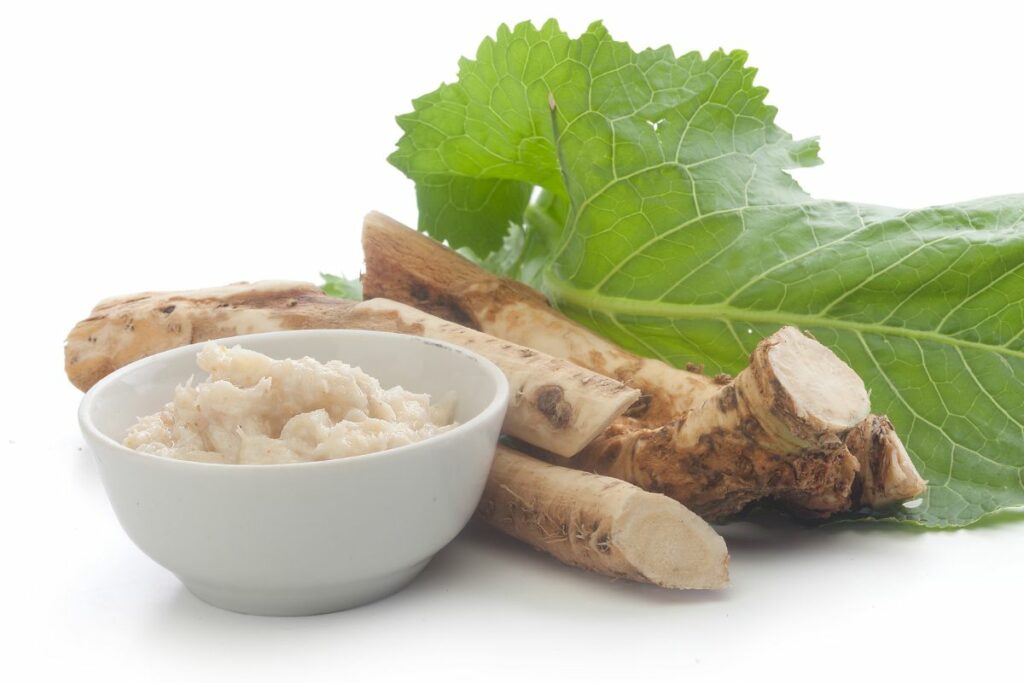Horseradish is a popular ingredient in many dishes, especially in European cuisine. It is known for its pungent flavor and aroma, which can add a unique kick to any dish. However, not everyone is a fan of horseradish, and some may be allergic to it. In these cases, finding a suitable horseradish substitute is essential.
Fortunately, there are many alternatives to horseradish that can provide similar flavors and aromas. Some of the best horseradish substitutes include wasabi, spicy brown mustard, black radishes, ginger, horseradish sauce, daikon, sauerkraut, and parsnip. Each of these substitutes has its unique flavor profile and can be used in different dishes. In this article, we will explore the best horseradish substitutes and how to use them in your cooking.

Contents
Understanding Horseradish
Horseradish is a perennial plant that belongs to the Brassicaceae family. It is known for its pungent, spicy flavor and is often used in cooking as a condiment. The plant is native to Europe and Asia, but it is now widely cultivated in many parts of the world.
Horseradish root is the most commonly used part of the plant. It is usually grated or ground into a paste and used as a condiment for meat, fish, and vegetables. Fresh horseradish root has a stronger flavor than prepared horseradish, which is a mixture of grated horseradish root, vinegar, and salt.
Horseradish sauce is a popular condiment made from a mixture of horseradish, vinegar, and sour cream or mayonnaise. It has a creamy texture and a tangy, spicy flavor that complements many dishes.
Horseradish powder is made by drying and grinding horseradish root. It is often used as a seasoning for meat and fish dishes.
Besides its culinary uses, horseradish is also known for its health benefits. It is a good source of vitamin C, potassium, calcium, and magnesium. Horseradish also contains compounds called glucosinolates, which have been shown to have anti-inflammatory and cancer-fighting properties.
Overall, horseradish is a versatile and flavorful ingredient that can be used in many different ways. Whether you are looking to add some heat to your favorite dish or reap the health benefits of this plant, horseradish is definitely worth trying out.
Common Horseradish Uses
Horseradish is a versatile condiment that can be used in a variety of dishes to add flavor and spice. It is commonly used in sauces, dressings, dips, and spreads. Here are some of the most common horseradish uses:
Sauce
Horseradish sauce is a popular condiment that is often served with roast beef, prime rib, and other meats. It is made by mixing grated horseradish with vinegar, salt, and sugar. Some recipes also call for the addition of sour cream or mayonnaise to create a creamier texture.
Flavor
Horseradish has a strong, spicy flavor that can add a kick to any dish. It is often used to flavor soups, stews, and sauces. It can also be added to deviled eggs, potato salad, and other side dishes to give them a little extra zing.
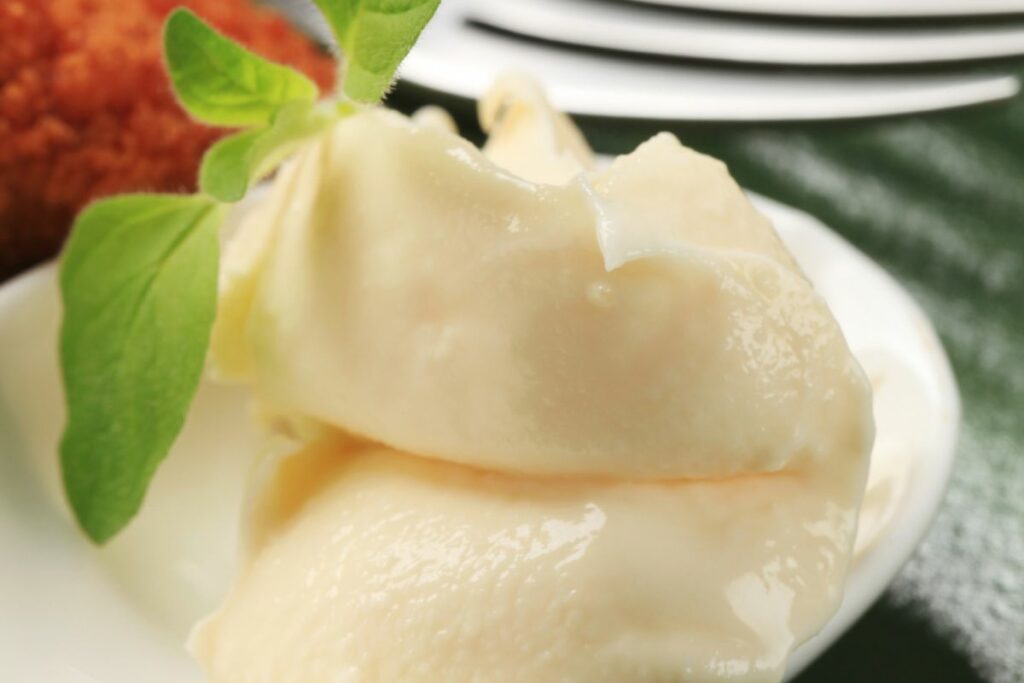
Taste
Horseradish has a unique taste that is both spicy and tangy. It is often used in cocktail sauce, which is a popular condiment for seafood. It can also be used to add flavor to Bloody Marys and other cocktails.
Recipe
Horseradish can be used in a variety of recipes, from appetizers to main dishes. It is often used in dips, such as spinach and artichoke dip, to add flavor and spice. It can also be used to make dressings for salads or as a topping for baked potatoes.
Overall, horseradish is a versatile ingredient that can be used in a variety of dishes to add flavor and spice. Whether you are making a sauce for roast beef or adding it to a dip, horseradish is sure to add a little extra kick to your favorite recipes.
Characteristics of a Good Substitute
When looking for a horseradish substitute, it is important to consider certain characteristics that make a good alternative. Here are some of the key characteristics to look for:
Flavor and Taste
One of the most important characteristics of a good horseradish substitute is the flavor and taste. Horseradish has a unique, pungent, and peppery taste that can be difficult to replicate. A good substitute should have a similar taste profile to horseradish, with a strong and spicy flavor that can enhance the overall taste of the dish.
Texture
Another important characteristic to consider is the texture of the substitute. Horseradish has a creamy and slightly gritty texture that can add depth and complexity to a dish. A good substitute should have a similar texture, with a creamy and slightly grainy consistency that can provide a satisfying mouthfeel.
Pungency
Horseradish is known for its pungency, which is the characteristic that gives it its distinctive flavor and aroma. A good substitute should have a similar level of pungency, with a strong and spicy flavor that can provide a flavorful kick to any dish.
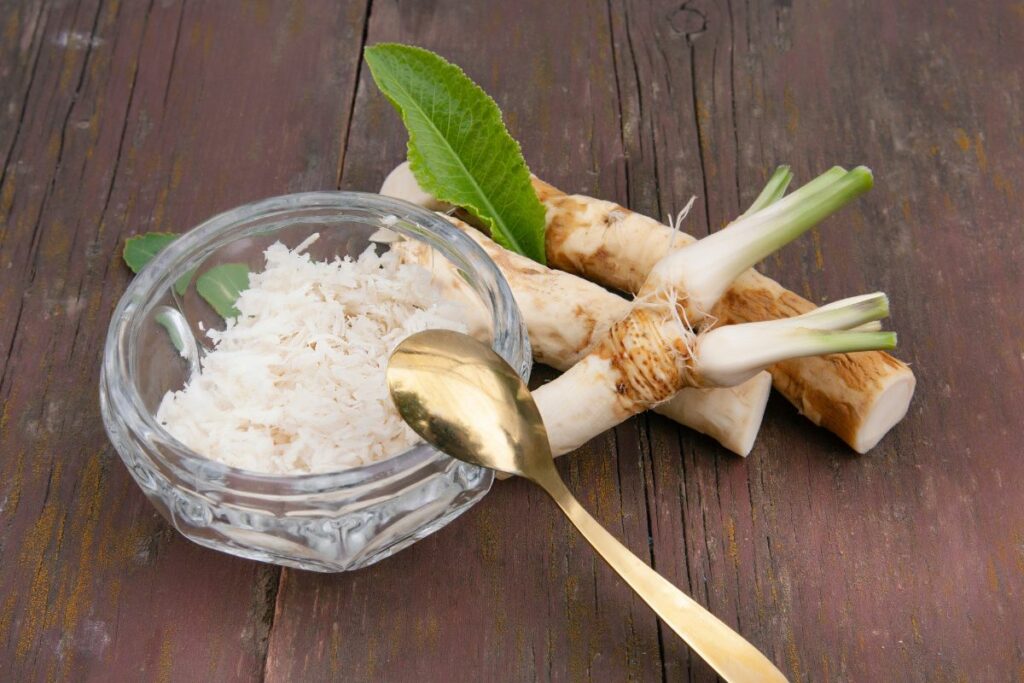
Spiciness
Horseradish is also known for its spiciness, which can add heat and intensity to a dish. A good substitute should have a similar level of spiciness, with a strong and spicy flavor that can add depth and complexity to the overall taste profile.
Flavor Enhancer
Finally, a good horseradish substitute should be able to enhance the flavor of the dish, rather than overpowering it. It should be able to complement the other ingredients in the dish and provide a balanced and harmonious flavor profile.
Overall, finding a good horseradish substitute can be challenging, but by considering these key characteristics, it is possible to find an alternative that can provide a similar flavor, texture, and aroma to horseradish.
Mustard as a Substitute
Mustard is a great substitute for horseradish sauce, especially if you don’t have fresh horseradish available. The best thing about using mustard as a substitute is the fact that there are many different types of mustard, each with its own unique flavor and characteristics.
Types of Mustard
Here are some of the different types of mustard that can be used as a substitute for horseradish:
- Dijon Mustard: This type of mustard is made from brown or black mustard seeds, vinegar, and white wine. It has a smooth texture and a tangy, slightly spicy flavor that makes it a great substitute for horseradish.
- Spicy Brown Mustard: Made from a combination of brown and yellow mustard seeds, vinegar, and spices, this type of mustard has a more intense flavor than Dijon mustard. It’s a good choice if you want to add some heat to your dish.
- Hot Mustard: As the name suggests, this type of mustard is very hot and spicy. It’s made from a combination of mustard seeds, vinegar, and horseradish, so it’s a natural substitute for horseradish.
- Mustard Powder: Made from ground mustard seeds, this type of mustard is a good substitute for fresh horseradish. It has a strong, pungent flavor and can be used in a variety of dishes.

Using Mustard as a Substitute
When substituting mustard for horseradish, keep in mind that the flavor and heat level may be different. Here are some tips for using mustard as a substitute:
- If the recipe calls for freshly grated horseradish, substitute using mustard seeds that have been ground up using a mortar and pestle.
- If the recipe calls for horseradish sauce, use Dijon mustard or spicy brown mustard as a substitute.
- If you want to add some heat to your dish, use hot mustard or a combination of mustard powder and vinegar.
Overall, mustard is a versatile substitute for horseradish that can add flavor and heat to a variety of dishes. Just be sure to choose the right type of mustard for your recipe and adjust the amount to taste.
Wasabi as a Substitute
Wasabi is a popular Japanese condiment that is commonly used with sushi. It has a unique flavor that is difficult to replicate, but it can be substituted with horseradish in a pinch. Wasabi paste is made from the grated root of the Wasabia plant, while horseradish is made from the grated root of the horseradish plant. The two plants are similar in taste, but wasabi has a more complex flavor.
When using wasabi as a substitute for horseradish, it is important to note that wasabi is spicier than horseradish. It is recommended to start with a smaller amount of wasabi and add more gradually until the desired level of spiciness is achieved.
Wasabi paste can be found in most grocery stores, or it can be made from wasabi powder. To make wasabi paste from powder, mix one part wasabi powder with two parts water and let it sit for a few minutes to thicken.
Wasabi oil is another option for those looking to substitute for horseradish. It is made by mixing wasabi powder with vegetable oil and can be used in place of horseradish oil in recipes.
Overall, while wasabi is not a perfect substitute for horseradish, it can be used in a pinch and offers a similar flavor profile.
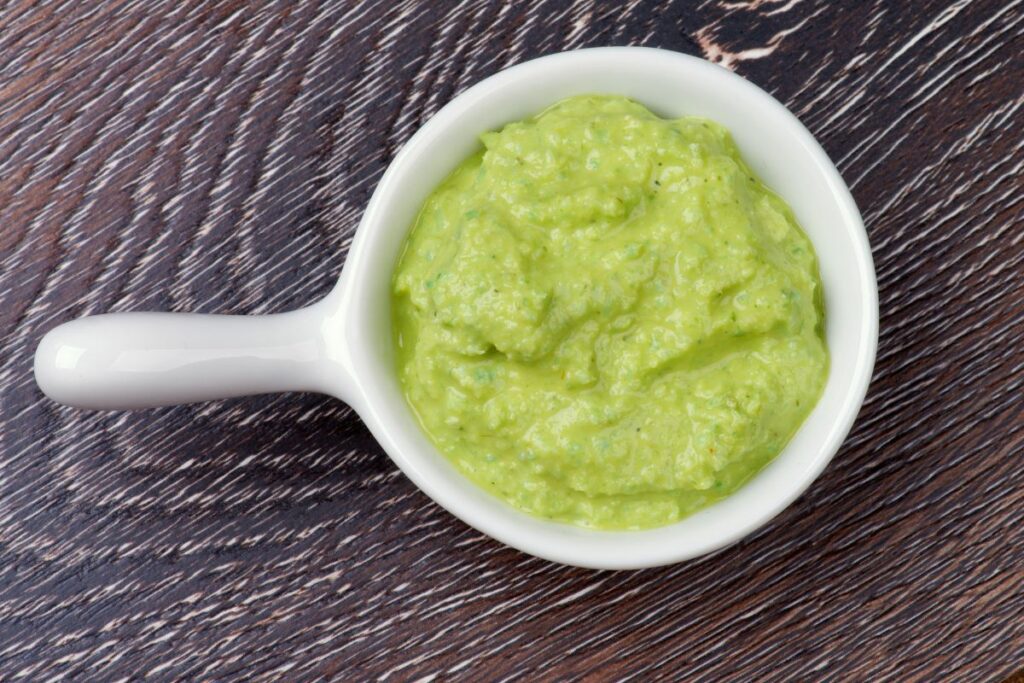
Ginger as a Substitute
Ginger is a great alternative to horseradish for those who want a milder flavor. It has a similar texture and a bit of spice that can elevate the flavor of the dish. Fresh ginger root is the best option, but ground ginger can also be used in a pinch.
To use fresh ginger root as a horseradish substitute, peel and grate it finely. Use about half the amount of ginger as you would use horseradish. For example, if the recipe calls for one tablespoon of horseradish, use half a tablespoon of grated ginger instead.
Ground ginger can also be used as a substitute for horseradish. However, it has a different texture and flavor profile than fresh ginger. Use about one-third of the amount of ground ginger as you would use horseradish. For example, if the recipe calls for one tablespoon of horseradish, use one teaspoon of ground ginger instead.
Ginger can be used in many dishes that call for horseradish. It pairs well with seafood, roasted meats, and vegetables. Ginger can also be used in sauces, marinades, and dressings.
Overall, ginger is a great substitute for horseradish for those who want a milder flavor. Fresh ginger root is the best option, but ground ginger can also be used. Use about half the amount of fresh ginger root as you would use horseradish, or one-third the amount of ground ginger.
Other Vegetable Substitutes
Horseradish is a unique root vegetable with a distinct flavor that is difficult to replicate. However, there are several other vegetables that can be used as substitutes for horseradish in recipes. Here are some of the best options:
Radish
Radish is a popular substitute for horseradish, especially in Asian cuisine. It has a similar spicy flavor and can be grated or pureed to create a paste that can be used in sauces and marinades. Black radish, in particular, has a sharp, pungent flavor that is similar to horseradish.
Pepper
Pepper is another great substitute for horseradish. Ground black pepper can be used to add a spicy kick to dishes, while cayenne pepper can be used to add heat. Freshly ground peppercorns can also be used to create a paste that can be used in place of horseradish.
Daikon
Daikon is a type of radish that is commonly used in Japanese cuisine. It has a mild, slightly sweet flavor and a crisp texture. It can be grated or pureed to create a paste that can be used as a substitute for horseradish.

Parsnip
Parsnip is a root vegetable that is similar in flavor to horseradish. It has a slightly sweet, nutty flavor and can be grated or pureed to create a paste that can be used in sauces and marinades.
Cabbage
Cabbage is a versatile vegetable that can be used in a variety of dishes. It can be grated or pureed to create a paste that can be used as a substitute for horseradish. Red cabbage, in particular, has a slightly spicy flavor that is similar to horseradish.
Rutabaga
Rutabaga is a root vegetable that has a slightly sweet, nutty flavor. It can be grated or pureed to create a paste that can be used as a substitute for horseradish.
Broccoli
Broccoli is a cruciferous vegetable that can be used as a substitute for horseradish in some dishes. It has a slightly bitter, spicy flavor that is similar to horseradish. It can be grated or pureed to create a paste that can be used in sauces and marinades.
Overall, while none of these vegetables can perfectly replicate the unique flavor of horseradish, they can be used as substitutes in many recipes. Experiment with different vegetables to find the best substitute for your specific dish.
Using Sauces and Creams
Sauces and creams can be used as a substitute for horseradish in many recipes. They can add a similar tangy and spicy flavor to dishes, without the strong pungency of horseradish. Here are some common sauces and creams that can be used as a horseradish substitute:
- Mayonnaise: Mayonnaise is a popular condiment that can be used as a base for many sauces. It has a creamy texture and a slightly tangy taste. To make a horseradish substitute, mix mayonnaise with mustard, lemon juice, and a pinch of salt. This sauce is perfect for sandwiches, burgers, and salads.
- Sour Cream: Sour cream is another creamy and tangy ingredient that can be used as a horseradish substitute. Mix sour cream with mustard, lemon juice, and a pinch of salt to create a tangy sauce that can be used as a dip for vegetables or a topping for baked potatoes.
- Hot Sauce: Hot sauce can be used as a substitute for horseradish in dishes that require a spicy kick. Tabasco sauce, for example, has a similar heat level to horseradish and can be used in dressings, marinades, and dips.
- Salt: Salt can be used to add a savory flavor to dishes that would otherwise require horseradish. For example, a sprinkle of salt on a roast beef sandwich can mimic the flavor of horseradish.
- Cream: Cream can be used to create a creamy and tangy sauce that can be used as a substitute for horseradish. Mix cream with mustard, lemon juice, and a pinch of salt to create a sauce that can be used as a dressing for salads or a topping for grilled chicken.
When using sauces and creams as a horseradish substitute, it’s important to remember that the flavor may not be exactly the same as horseradish. However, they can add a similar tangy and spicy flavor to dishes and are a great option for those who don’t enjoy the strong pungency of horseradish.
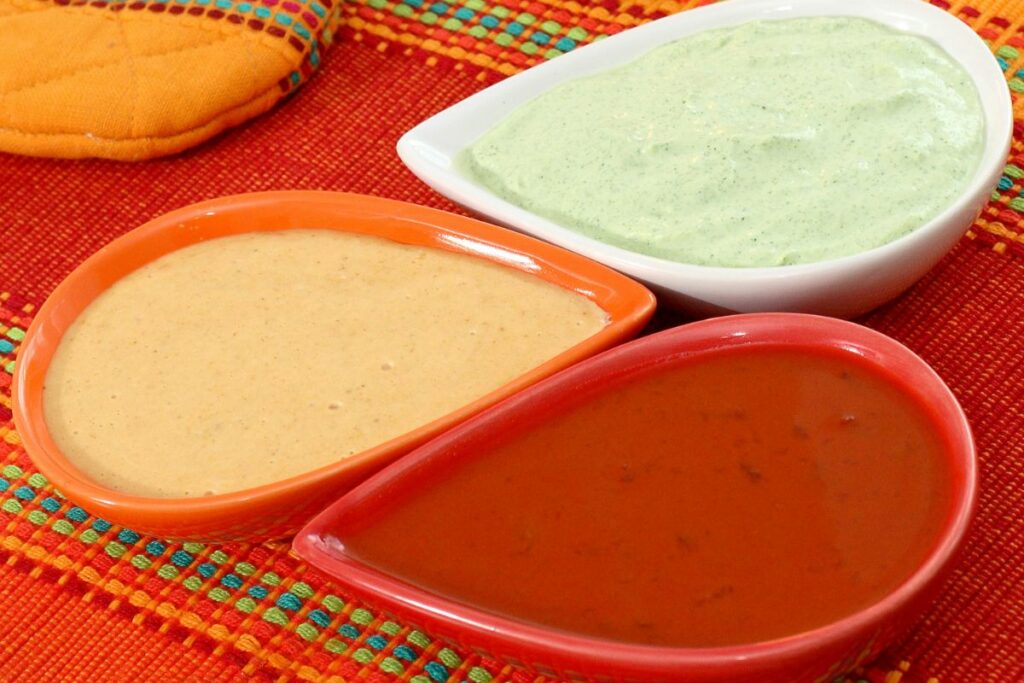
Exploring Additional Substitutes
While the previous section covered some of the best horseradish substitutes, there are still a few more options worth exploring. Here are some additional substitutes that can be used in place of horseradish in certain situations:
Water and Lemon Juice
If you are looking for a substitute for fresh horseradish, you can use a combination of water and lemon juice. Simply mix equal parts of water and lemon juice and use it in place of fresh horseradish. This will provide a tangy flavor that is similar to horseradish.
Sugar
If you are looking to add sweetness to your horseradish substitute, you can add some sugar. This will help balance out the heat and provide a more mellow flavor. However, use sugar sparingly as it can easily overpower the other flavors.
Chili Paste
For those who love spicy food, chili paste is an excellent horseradish substitute. It provides a similar heat level and can be used in a variety of dishes. However, be careful when using chili paste as it can be quite spicy.
Tube Wasabi
If you are looking for a convenient horseradish substitute, tube wasabi is a great option. It is easy to find in most grocery stores and provides a similar flavor to horseradish. However, tube wasabi is much milder than fresh horseradish, so you may need to use more of it to achieve the desired flavor.
Prepared Horseradish Substitute
If you want a substitute that is specifically designed to mimic the flavor of horseradish, you can try a prepared horseradish substitute. These substitutes are typically made with a combination of mustard, vinegar, and other spices. They provide a similar flavor to horseradish and can be used in a variety of dishes.
Overall, there are many horseradish substitutes available that can be used in a variety of dishes. Whether you are looking for something spicy or sweet, there is a substitute out there that can meet your needs.
